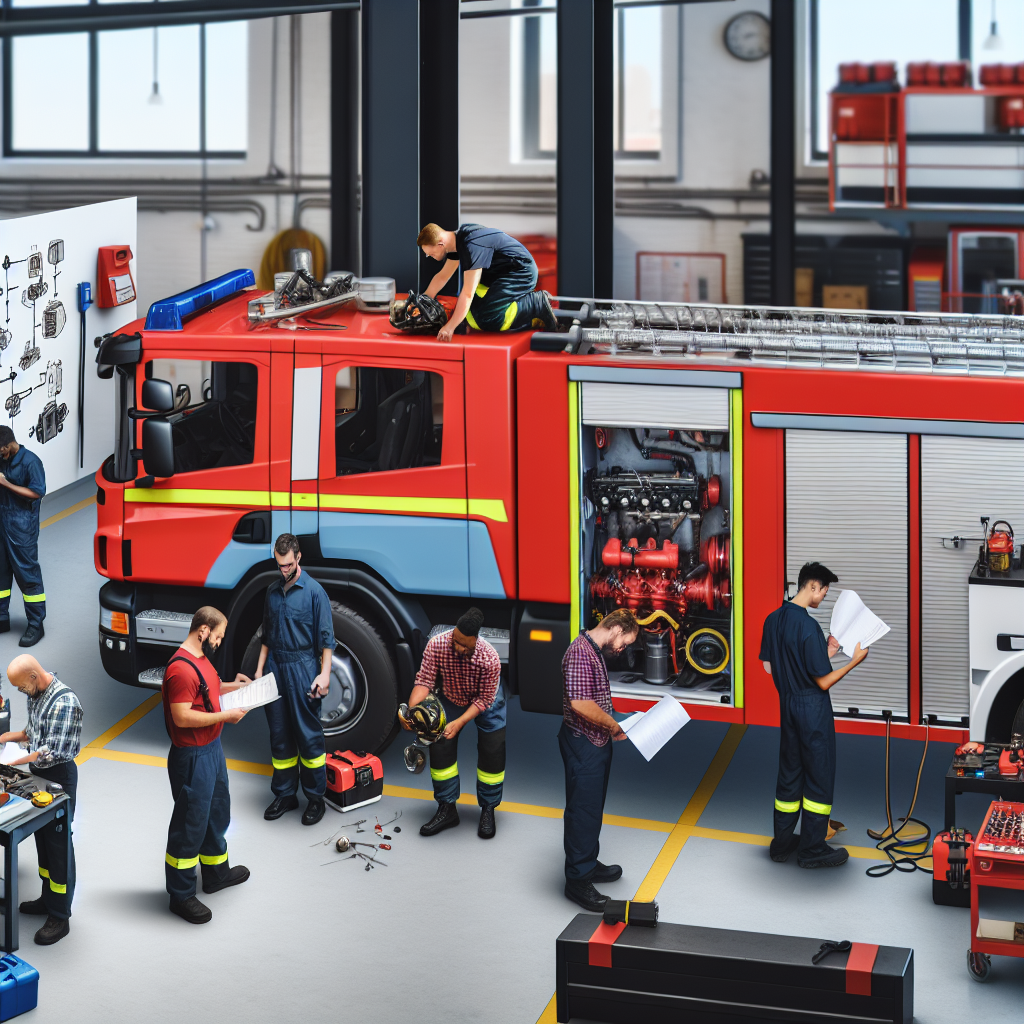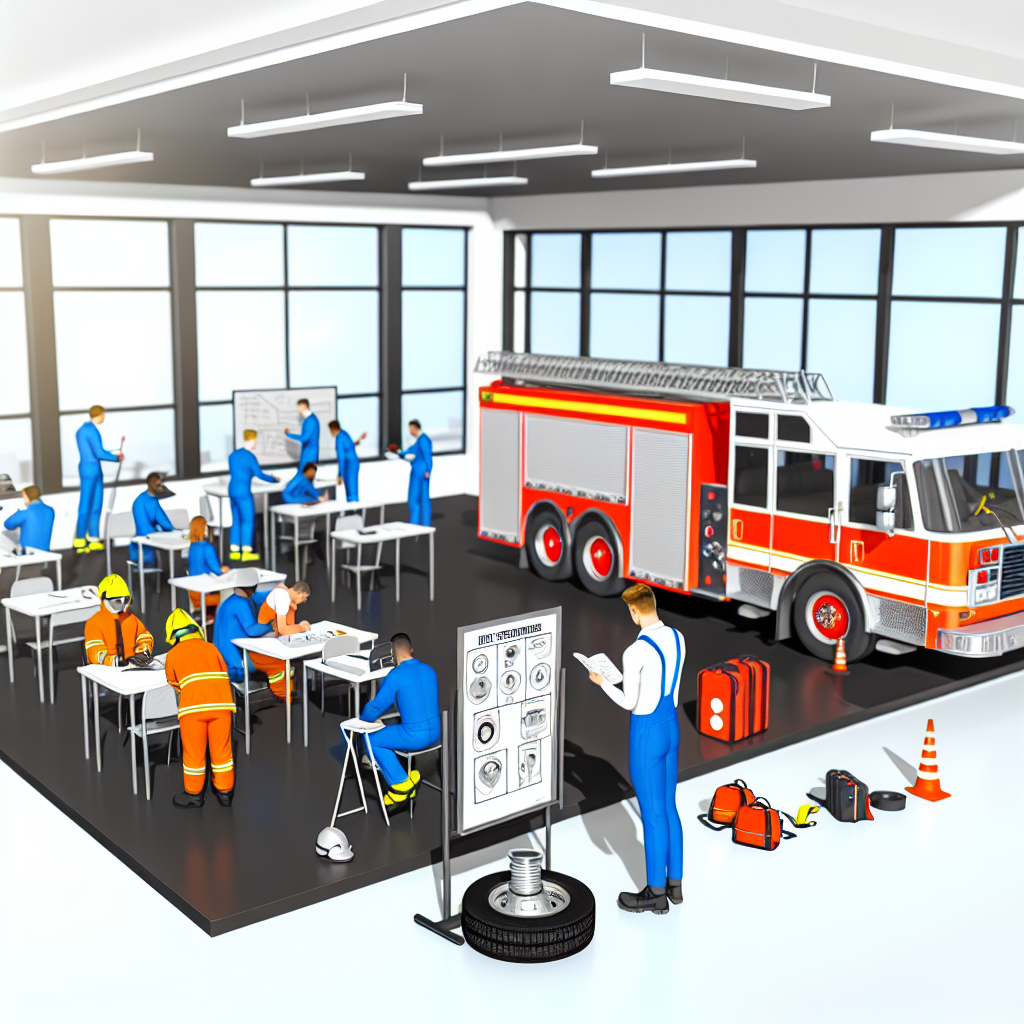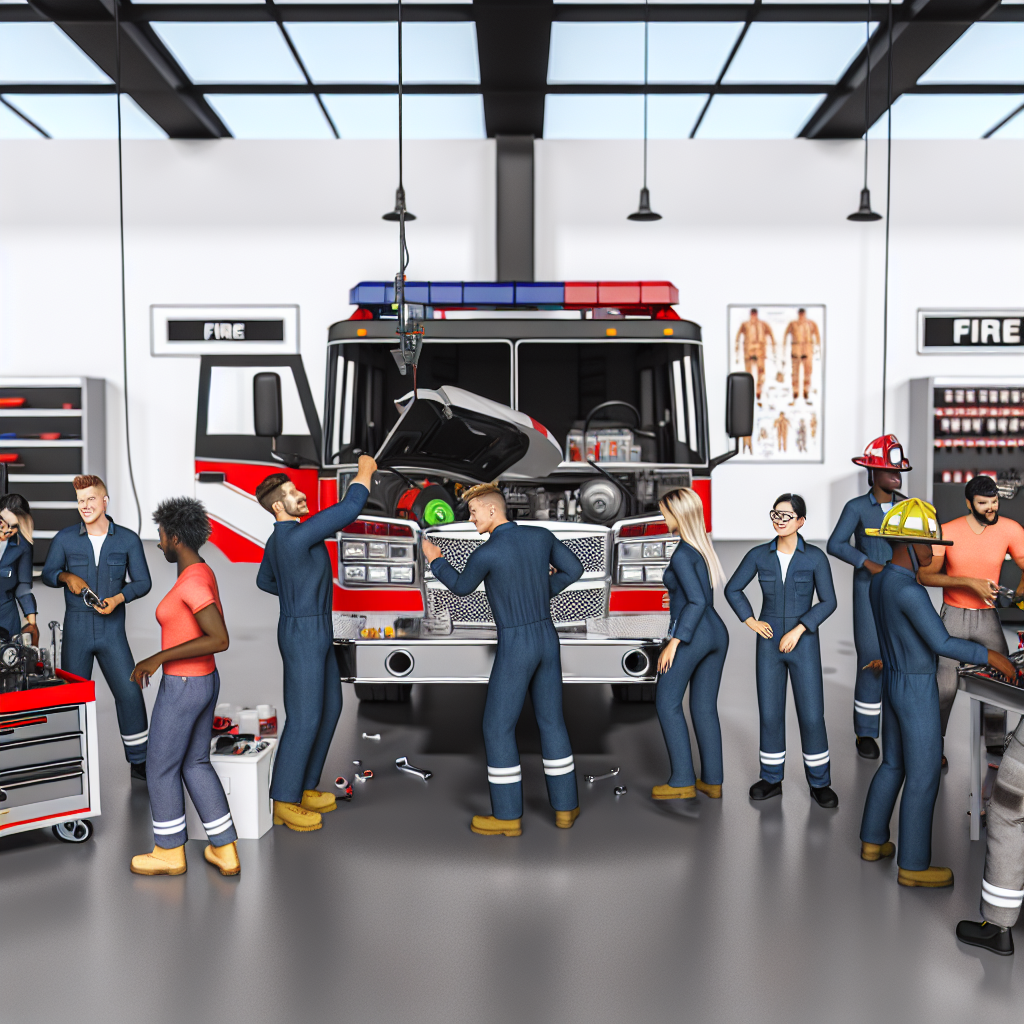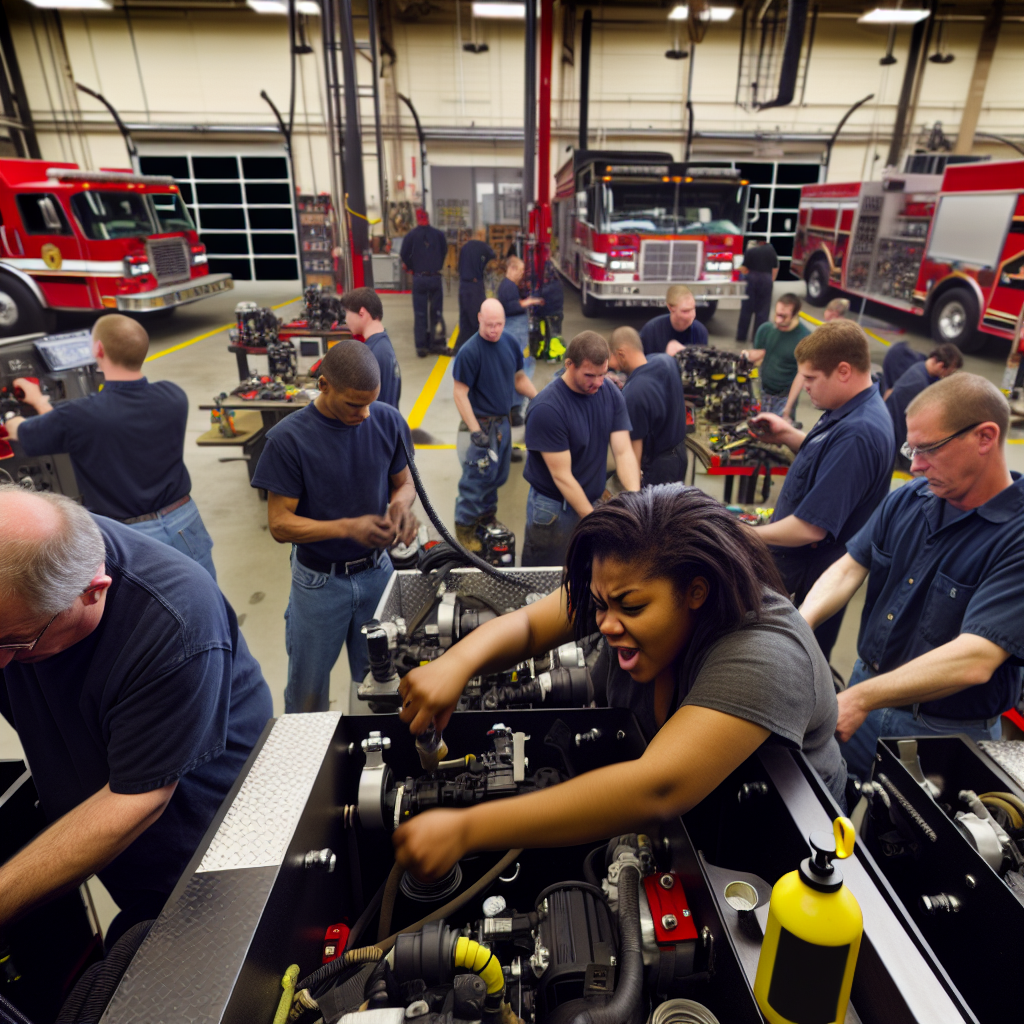In the high-stakes world of emergency response, every second counts, and the reliability of fire trucks can mean the difference between life and death. As first responders rely on their vehicles to perform flawlessly in critical situations, the importance of customized maintenance training for fire truck fleets becomes undeniable.
Tailored fire truck maintenance and service training ensures that each apparatus operates at peak performance, addressing the unique specifications and complexities of specialized equipment. This bespoke training not only enhances the technical knowledge of fire department personnel but also fortifies the safety and efficiency of their operations.
With a well-maintained fleet, departments can respond swiftly and effectively, ensuring their communities remain protected. Investing in customized training prepares technicians to tackle the challenges of fire apparatus maintenance, paving the way for improved reliability and performance when it matters most.
Join us as we explore the pivotal role that customized maintenance training plays in safeguarding our heroes and enhancing the performance of fire truck fleets.

The Significance of Customized Training
In the demanding environment that fire departments operate within, having vehicles that function correctly at all times is paramount. Customized training plays a vital role in ensuring that technicians understand and can maintain the unique specifications of the various fire apparatus in their fleet.
From commercial pumpers to aerials, rescue trucks, and wildland trucks, each type of vehicle brings its own set of complexities and operational demands.
Fire apparatus are designed specifically for each department’s needs, and this specificity extends to their maintenance and service training. For instance, understanding the intricacies of a fire truck’s foam systems or its Side Roll Protection system requires in-depth training tailored to those systems. Pierce Manufacturing has recognized this need since 1997, offering customized service training to ensure that technicians possess the essential skills for effective maintenance.
Moreover, the logistics of emergency response hinge on the reliability of fire trucks, particularly during critical situations. If a fire truck is not maintained correctly or if the technician lacks the appropriate knowledge, it can result in failure at a crucial moment, endangering lives and property. This risk emphasizes why customized training is not just beneficial but essential for fire departments.
By offering training sessions focused on the specific features of different fire apparatus, departments can ensure their personnel are well-prepared to handle any maintenance issues that arise.
Communities rely heavily on their fire departments, and knowing that technicians have undergone customized, hands-on training fosters a sense of confidence among community members.
When fire truck performance is optimized through specialized training, departments can respond quickly and effectively to emergencies, ultimately enhancing public safety. Therefore, investing in customized maintenance training for fire truck fleets is a proactive measure that safeguards both technicians and the communities they serve.
Knowing that a fire truck comes with the support of knowledgeable dealers, master technicians, and access to year-round hands-on training can make a big difference in the fire apparatus selection process.
The Significance of Customized Training
In the demanding environment of fire services, customized training is crucial for ensuring that technicians possess the necessary expertise to maintain the unique specifications of various fire apparatus. Each type of fire truck, from commercial pumpers to aerials and rescue vehicles, has its own set of complexities that must be understood for effective maintenance. Fire apparatus are often tailored specifically to meet the needs of individual departments, incorporating distinctive systems that require specialized knowledge.
Since 1997, Pierce Manufacturing has embraced the principle of customized service training, recognizing that effective maintenance goes beyond generic training sessions. Their dedicated programs are structured to instill in technicians a thorough understanding of the intricacies involved in each apparatus, including critical features such as foam systems and advanced safety technologies like the Side Roll Protection system. This tailored approach not only enhances the technical capabilities of personnel but also addresses the operational demands of emergency response.
The risks associated with inadequate maintenance knowledge can be severe. A poorly maintained fire truck may malfunction during a critical emergency, potentially leading to disastrous outcomes. Historical data points such as the Prince George’s County Fire/EMS Department reveal that optimized maintenance protocols can lead to significantly improved response times and operational reliability; for instance, Rescue Squad No. 820 responded to over 1,800 emergencies in 2024 alone.
Moreover, when technicians are not adequately trained, the likelihood of overlooking essential maintenance tasks rises, which could jeopardize both the safety of firefighters and the communities they serve. Custom training not only equips maintenance teams with the necessary skills to handle specific systems but also builds confidence among personnel. When staff members know that they are well-prepared to address any maintenance issues, their ability to respond effectively increases, ultimately resulting in enhanced public safety.
Investing in customized maintenance training for fire truck fleets is a proactive measure that safeguards both technicians and the communities they protect. Knowing that a fire truck comes with comprehensive support from knowledgeable dealers and access to year-round hands-on training can significantly influence departments in their equipment choices and operational readiness.
Summary of Classes Offered by Pierce Manufacturing
Pierce Manufacturing provides a comprehensive suite of 15 fire truck maintenance and service training classes, each designed to equip technicians with necessary knowledge and practical skills for optimal performance of fire apparatus. Most classes are structured as 16-hour, two-day sessions combining classroom instruction with hands-on technical training.
| Class Name | Topics Covered | Format |
|---|---|---|
| Chassis Electrical | Non-multiplex electrical systems and components on Pierce chassis. | Classroom and practical exercises |
| Command Zone™ Systems | Pierce’s Command Zone™ electrical systems, including Command Zone III. | Theoretical learning and hands-on application |
| Preventative Maintenance | Procedures for fire apparatus maintenance based on NFPA and DOT standards. | Lecture sessions and practical demonstrations |
| TAK-4® Suspension Maintenance | Design principles, maintenance, and repair of the TAK-4® Independent Front Suspension system. | Classroom learning and hands-on exercises |
| SRP/Frontal Protection | Installation, repair, and troubleshooting of SRP and Frontal Impact Protection systems. | Instruction with practical troubleshooting activities |
| CAFS/Husky Maintenance | Operation, maintenance, and repair of Husky™ Foam Systems and Hercules™ Compressed Air Foam Systems. | Theoretical instruction with hands-on maintenance |
| Air Conditioning Systems | Repair and maintenance of Pierce-installed air conditioning components. | Classroom training with practical servicing |
| Aerial Maintenance | Repair and maintenance of Pierce aerial ladders and platforms. | Instruction lectures and hands-on tasks |
| Pierce PUC™ Pump Maintenance | Operation, maintenance, and disassembly of Rear Engine Power Take-Off (REPTO) driven water pump. | Classroom learning and disassembly exercises |
| Air Brakes, ESC, ABS Troubleshooting | Air brake theory and maintenance procedures for chassis air brake systems, including ESC and ABS. | Theoretical instruction with hands-on activities |
| Ascendant Mid Mount | Repair and maintenance of Ascendant Class 100′ Aerial towers. | Classroom instruction and practical maintenance |
| TAK-4 T3™ | Maintenance and troubleshooting of TAK-4 T3™ features. | One-day class with theoretical and hands-on application |
| Tiller Aerial Maintenance | Repair and maintenance of Pierce® Tiller Aerial ladders. | Instructional sessions with practical tasks |
| Chassis Diagnosis | Evaluation of drivability issues and advanced troubleshooting of chassis component failures. | Classroom instruction and hands-on diagnostics |
| Air Conditioning Maintenance | Repair and maintenance of Pierce-installed air conditioning components. | Classroom sessions and practical servicing |
These training offerings are available at the Pierce Training Center in Appleton, Wisconsin, regional sites throughout North America, and can be conducted in-house for specific departments. The dual focus on theoretical knowledge and practical skills makes these classes essential for technicians maintaining Pierce fire apparatus.
Benefits of Hands-On Technical Training
Hands-on technical training in fire truck maintenance is essential for developing a skilled workforce capable of ensuring that these vital emergency vehicles operate at peak performance. Here are some key benefits associated with this type of training:
- Practical Experience and Improved Retention: Engaging in hands-on training allows trainees to actively apply the theoretical knowledge gained from classroom sessions in real-world settings. Research indicates that experiential learning leads to better retention of information. According to Automotive Quest, practical engagement significantly enhances learning outcomes in technical fields, facilitating a deeper understanding of vehicle systems and components [source].
- Increased Confidence: Confidence is vital for technicians who are responsible for the care and maintenance of complex fire apparatus. Regular participation in hands-on training builds competency through skill assessments, allowing personnel to practice critical tasks until they feel assured in their abilities. A study conducted by Vector Solutions revealed that hands-on training notably increases a firefighter’s readiness and self-assurance, crucial in high-pressure situations [source].
- Enhanced Problem-Solving Skills: Direct interaction with equipment encourages technicians to think critically and innovate solutions under real-time pressures. When exposed to hands-on training scenarios, participants develop effective strategies for tackling unexpected maintenance challenges during emergencies. Fleet Maintenance highlights that this training improves technicians’ skills in finding practical solutions, ultimately improving operational effectiveness [source].
- Increased Job Readiness: Graduates of hands-on training programs enter the workforce equipped with relevant skills demanded by employers. These programs bridge the gap between theoretical knowledge and practical application, providing a competitive advantage for technicians seeking employment in fire truck maintenance. Automotive Quest explains that hands-on training enhances employability by fostering specialized, in-demand skills [source].
- Enhanced Efficiency and Reduced Downtime: Technicians who receive specialized training can complete maintenance tasks more quickly and accurately. Well-trained personnel result in improved first-time fix rates and decreased downtime for emergency vehicles. Some reports indicate efficiency improvements of up to 40%. Reducing operational downtime not only helps maintain a fire department’s responsiveness but also leads to significant cost savings [source].
In summary, the integration of hands-on training into fire truck maintenance programs is crucial for developing skilled, confident, and efficient technicians. Such training improves overall performance and safety on the front lines while ensuring that emergency response vehicles are always ready to operate effectively when needed.
User Testimonial: The Impact of Customized Training
“After attending the customized training program offered by Pierce Manufacturing, our department has witnessed a significant change in our maintenance operations. The training not only improved our technicians’ understanding of the unique specifications of our fire apparatus but also instilled a greater sense of confidence in their abilities.
The hands-on approach allowed our team to engage directly with the equipment, enhancing their problem-solving skills and technical knowledge. Since implementing what we learned, we’ve reported a noticeable decrease in equipment downtime and quicker response times during emergencies.
Our community can now feel reassured that our fire trucks are in optimal condition, thanks to the customized training we received from Pierce. This investment has made a tremendous difference in our ability to serve and protect our residents effectively.”
This testimonial reflects the sentiments of many fire departments who have participated in Pierce’s training programs. With tailored classes that focus on real-world applications, departments are not just repairing trucks better; they are improving their operational readiness, which translates into heightened community safety.
Moreover, the training curricula developed by Pierce Manufacturing highlight the importance of understanding each fire apparatus’ specific features, leading to enhanced performance, financial savings, and an overall improved customer experience for communities relying on these vital emergency services.
User Testimonial: The Impact of Customized Training
“After attending the customized training program offered by Pierce Manufacturing, our department has witnessed a significant change in our maintenance operations. The training not only improved our technicians’ understanding of the unique specifications of our fire apparatus but also instilled a greater sense of confidence in their abilities.
The hands-on approach allowed our team to engage directly with the equipment, enhancing their problem-solving skills and technical knowledge. Since implementing what we learned, we’ve reported a noticeable decrease in equipment downtime and quicker response times during emergencies.
Our community can now feel reassured that our fire trucks are in optimal condition, thanks to the customized training we received from Pierce. This investment has made a tremendous difference in our ability to serve and protect our residents effectively.”
This testimonial reflects the sentiments of many fire departments who have participated in Pierce’s training programs. With tailored classes that focus on real-world applications, departments are not just repairing trucks better; they are improving their operational readiness, which translates into heightened community safety.
Moreover, the training curricula developed by Pierce Manufacturing highlight the importance of understanding each fire apparatus’ specific features, leading to enhanced performance, financial savings, and an overall improved customer experience for communities relying on these vital emergency services.
Industry Standards for Fire Truck Maintenance Training
In the field of fire truck maintenance, adhering to industry standards and best practices is paramount to ensure the reliability of emergency response vehicles and the safety of firefighters and the communities they serve. Key standards provided by the National Fire Protection Association (NFPA), particularly NFPA 1002 and NFPA 1911, serve as benchmarks for the development of effective maintenance training programs.
Customized Training Necessity
Fire apparatus are often uniquely designed to suit the specific needs of individual fire departments. This customization necessitates equally tailored maintenance training programs that equip technicians with the knowledge and skills required to manage the specific systems and components of their fire trucks effectively. For instance, focused training on specialty equipment such as foam systems, aerial ladders, or advanced braking systems can significantly enhance a technician’s ability to perform maintenance efficiently and safely.
Risks of Inadequate Training
Failing to implement comprehensive and customized maintenance training can lead to severe risks. Operational inefficiencies may arise, causing delays in emergency responses as technicians struggle to operate, repair, or maintain poorly understood systems. Additionally, lacking proper training can overlook critical maintenance issues, potentially leading to vehicle failures during emergencies. Such inadequacies jeopardize not only the safety of the firefighters but also the public who relies on prompt and effective emergency services. Safety hazards also arise when technicians are not familiar with the equipment they are working on, increasing the likelihood of accidents or improperly conducted maintenance tasks.
Benefits of Adhering to Standards
By following NFPA standards and investing in customized training programs, fire departments can mitigate these risks. NFPA 1002 highlights the essential role of comprehensive training for fire apparatus driver/operators, while NFPA 1911 emphasizes consistent inspection and maintenance practices for fire trucks to keep them operable and effective. Departments that implement these standards through customized training ensure their technicians are not only meeting required competencies but are also confident in their roles, which contributes to overall operational readiness and community safety.
Finally, investing in such specialized training has far-reaching benefits, leading to improved technician readiness, reduced equipment downtime, and enhanced public confidence in fire department capabilities. Training that meets unique needs fosters a culture of safety and preparedness, critical components in maintaining efficient emergency response systems.
Industry Standards for Fire Truck Maintenance Training
In the field of fire truck maintenance, adhering to industry standards and best practices is paramount to ensure the reliability of emergency response vehicles and the safety of firefighters and the communities they serve. Key standards provided by the National Fire Protection Association (NFPA), particularly NFPA 1002 and NFPA 1911, serve as benchmarks for the development of effective maintenance training programs.
NFPA Guidelines for Fire Truck Maintenance Training
Several NFPA standards are pivotal in shaping fire truck maintenance training:
- NFPA 1002: Standard for Fire Apparatus Driver/Operator Professional Qualifications
This standard outlines the qualifications necessary for fire apparatus operators, emphasizing the importance of comprehensive training in vehicle operation and maintenance. [source] - NFPA 1451: Standard for a Fire and Emergency Services Vehicle Operations Training Program
NFPA 1451 mandates that drivers undergo two hands-on training sessions annually. It also specifies that driver trainers should meet the qualifications for Instructor I, as detailed in NFPA 1041. [source] - NFPA 1500: Standard on Fire Department Occupational Health and Safety Program
This standard emphasizes the implementation of safety programs, regular training, and the use of protective equipment to ensure firefighter safety. [source] - NFPA 1911: Standard for the Inspection, Maintenance, Testing, and Retirement of In-Service Emergency Vehicles
NFPA 1911 provides guidelines for the regular inspection and maintenance of fire apparatus to ensure they remain in optimal working condition. [source]
Customized Training Necessity
Fire apparatus are often uniquely designed to suit the specific needs of individual fire departments. This customization necessitates equally tailored maintenance training programs that equip technicians with the knowledge and skills required to manage the specific systems and components of their fire trucks effectively. For instance, focused training on specialty equipment such as foam systems, aerial ladders, or advanced braking systems can significantly enhance a technician’s ability to perform maintenance efficiently and safely.
Risks of Inadequate Training
Failing to implement comprehensive and customized maintenance training can lead to severe risks. Operational inefficiencies may arise, causing delays in emergency responses as technicians struggle to operate, repair, or maintain poorly understood systems. Additionally, lacking proper training can overlook critical maintenance issues, potentially leading to vehicle failures during emergencies. Such inadequacies jeopardize not only the safety of the firefighters but also the public who relies on prompt and effective emergency services. Safety hazards also arise when technicians are not familiar with the equipment they are working on, increasing the likelihood of accidents or improperly conducted maintenance tasks.
Benefits of Adhering to Standards
By following NFPA standards and investing in customized training programs, fire departments can mitigate these risks. NFPA 1002 highlights the essential role of comprehensive training for fire apparatus driver/operators, while NFPA 1911 emphasizes consistent inspection and maintenance practices for fire trucks to keep them operable and effective. Departments that implement these standards through customized training ensure their technicians are not only meeting required competencies but are also confident in their roles, which contributes to overall operational readiness and community safety.
Finally, investing in such specialized training has far-reaching benefits, leading to improved technician readiness, reduced equipment downtime, and enhanced public confidence in fire department capabilities. Training that meets unique needs fosters a culture of safety and preparedness, critical components in maintaining efficient emergency response systems.

In conclusion, customized maintenance training for fire truck fleets stands as a pillar of safety and efficiency in emergency response operations. When fire departments tailor their training programs to fit the unique specifications of their fire apparatus, they not only enhance the knowledge of their technicians but also improve the reliability of their vehicles. This training addresses the specific complexities of each fire truck, facilitating better understanding and execution of maintenance. As a result, departments can ensure their fleets remain operational and ready to respond at a moment’s notice, safeguarding the very communities they serve. By investing in such training, fire departments mitigate risks associated with inadequate knowledge and maintenance, ultimately translating into quicker response times and enhanced public safety. We encourage fire departments to explore customized maintenance training options, making this vital investment in both their personnel and the safety of their communities. Remember, the effectiveness of your emergency response hinges on a well-maintained fleet, and the right training can make all the difference.
In conclusion, customized maintenance training for fire truck fleets is essential in enhancing safety, efficiency, and community protection. Throughout this article, we have highlighted the necessity of tailored training programs that align with the unique specifications of fire apparatus, ensuring that technicians possess the knowledge and skills needed for effective maintenance. By investing in such programs, fire departments not only improve the reliability of their vehicles but also streamline operations, leading to quicker response times during emergencies. Through targeted training sessions, departments can cultivate a highly skilled workforce capable of addressing the specific complexities associated with fire truck maintenance. This investment not only safeguards the well-being of firefighters but also instills confidence in the communities they serve, knowing that their emergency services are well-equipped to handle crises efficiently. We urge all fire departments to prioritize customized maintenance training as a crucial component of their operational strategy, recognizing its significant role in maintaining high safety standards and operational readiness.
Customized Fire Truck Maintenance Training Programs
Fire truck maintenance training programs play a crucial role in ensuring the reliability and safety of fire apparatus. Departments focusing on customized training can significantly benefit from programs designed to meet their specific needs. Here are some key offerings:
-
Maryland Fire and Rescue Institute (MFRI) – Pumping Apparatus Driver/Operator Course
Overview: A 36-hour course covering operations and maintenance specific to various pumping apparatus.
More Information -
Kansas Fire & Rescue Training Institute – Firefighter Training Program
Overview: This program offers a range of courses including driver/operator for fire apparatus tailored to meet national certification standards.
More Information -
Illinois Fire Service Institute – Apparatus Operator Courses
Overview: The institute provides training tailored to Aerial Apparatus Driver/Operator and basic Aerial Apparatus Operations.
More Information -
Emergency Vehicle Training Courses (EVTS) – Fire Apparatus Training
Overview: Specialized courses focusing on inspection, maintenance, and testing of fire apparatus.
More Information -
South Dakota Firefighter Training – Apparatus Operator Training
Overview: A program coordinating courses for fire apparatus driver/operators, offering certification and a training calendar.
More Information
The Role of Customized Training
Customized training ensures that technicians are well-prepared and capable of addressing the unique aspects of each fire apparatus within their fleet. Knowing how to effectively maintain vehicles such as commercial pumpers, aerials, and rescue trucks makes all the difference in operational readiness.
The Impact of Proper Maintenance Training
“Communities are at risk when fire trucks cannot respond to service calls. Knowing that a fire truck comes with the support of knowledgeable dealers, master technicians, and access to year-round hands-on training can make a big difference in the fire apparatus selection process.”
This highlights the importance of investing in tailored programs like fire truck maintenance training programs and fire apparatus service. These offerings enhance technician expertise, leading to more efficient, safer emergency response capabilities.



